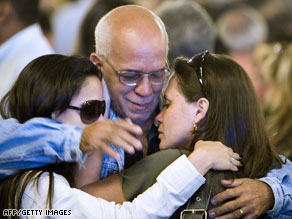Air France 447 - Airbus: Lost jet had inconsistent airspeed data
 Click here for more news / Clique aqui para mais notícias
Click here for more news / Clique aqui para mais notícias
(CNN) -- Automated messages sent from Air France Flight 447 just before it disappeared this week indicate the plane's systems were providing contradictory information about its airspeed, the jet's manufacturer said Friday.

Friends and relatives of the 228 people aboard Air France Flight 447 attend a memorial service Thursday in Brazil.
In addition, investigators have said the plane's autopilot disengaged, cabin pressure was lost and there was an electrical failure before the disaster.
Transmissions from the aircraft in the final moments before it vanished over the Atlantic Ocean show there was an "inconsistency" in measured airspeeds, Airbus said.
Experts say that could mean the pilot's and co-pilot's sensors were showing different speeds.
"If they're malfunctioning, it can give a false read that can be misinterpreted in the cockpit, and a disaster can follow," said Peter Goeltz, the former managing director of the National Transportation Safety Board.
Goeltz also said it is possible that the jet's speed indicator was faulty.
"That could really be disastrous, and it's happened before," he said, speaking generally.
Don't Miss
The jet flew into a storm before going down and may have been flying at the wrong speed for those weather conditions, officials have said.
The pilots sent no distress calls, but the aircraft's computer system relayed about four minutes of automated messages indicating a loss of cabin pressure and an electrical failure, according to investigators.
Airbus confirmed to CNN on Friday that in the wake of the crash, it sent a Telex to operators of that type of jet -- the A330-200 -- reminding them of what to do when speed indicators give conflicting readouts.
Airbus said the message was recommended by the French investigating agency, which plans to hold a news conference Saturday morning.
On its Web site, Airbus says the plane was delivered to Air France in April 2005. It had accumulated about 18,800 flight hours in about 2,500 flights.
"Airbus has offered full technical assistance to the investigation board," the company said. It also offers sympathy to the "families, friends and loved ones affected" by the crash.
Meanwhile, Goeltz said the search for the voice and data recorders from the Airbus becomes more difficult as ocean currents take any debris away from the crash site.
"The batteries on these locator devices attached to the black boxes have a limited life span -- just 30 days," he told CNN's "American Morning."
"The longer time goes on, the further away from the actual crash site the debris floats.
"It's just going to be terribly challenging to find where to start the search for these data recorders, and the clock's ticking," Goeltz said.
Adding urgency to the search for wreckage from the A330, Brazilian officials said Thursday debris pulled aboard search ships from the Atlantic Ocean this week was not from the aircraft, which disappeared Monday on a flight from Rio de Janeiro, Brazil, to Paris, France. ![]() Watch as experts question whether recovery is possible »
Watch as experts question whether recovery is possible »
All 228 passengers and crew aboard the jetliner died when it went down Monday northeast of Fernando de Noronha Islands, an archipelago 355 kilometers (220 miles) off the northeast coast of Brazil. ![]() Map of Flight 447's flight path »
Map of Flight 447's flight path »
While the depth of the ocean presents a challenge, "We've recovered boxes as deep as 6 or 7,000 feet. We've recovered debris from as much as 10,000 feet," Goeltz said.
Various authorities have said the depth of the water in the area ranges from 3,000 meters (9,840 feet) to 7,500 meters (24,600 feet).
Cmdr. Christophe Prazuck of the French Ministry of Defense said Friday night that a French research vessel carrying a deep-diving submersible is headed for the search area. The submarine could pinpoint the recorders, he said, but it must rely on another vessel to retrieve them.
The submersible, which helped recover artifacts from the Titanic disaster, is expected to reach its destination this weekend.
Investigators said the plane flew through lightning and turbulence, but they don't know what role, if any, the weather might have played in the crash.
Meanwhile, there has been broad speculation about why the Air France plane crashed, and France's transportation minister has warned that "extreme prudence" should be used in releasing information.
Investigators also say the autopilot system that flies the plane much of the time may have failed.
A Spanish pilot reported seeing an "intense flash" in the locale where the plane was lost, the Spanish carrier Air Comet told CNN on Thursday, confirming a report in the Spanish daily El Mundo.
The co-pilot and a passenger on the flight between Lima, Peru, and Lisbon, Portugal, also said they saw a light. Air Comet said a written copy of the pilot's report has been sent to Air France, Airbus and the Spanish civil aviation authority.
CNN's Richard Quest contributed to this report.





